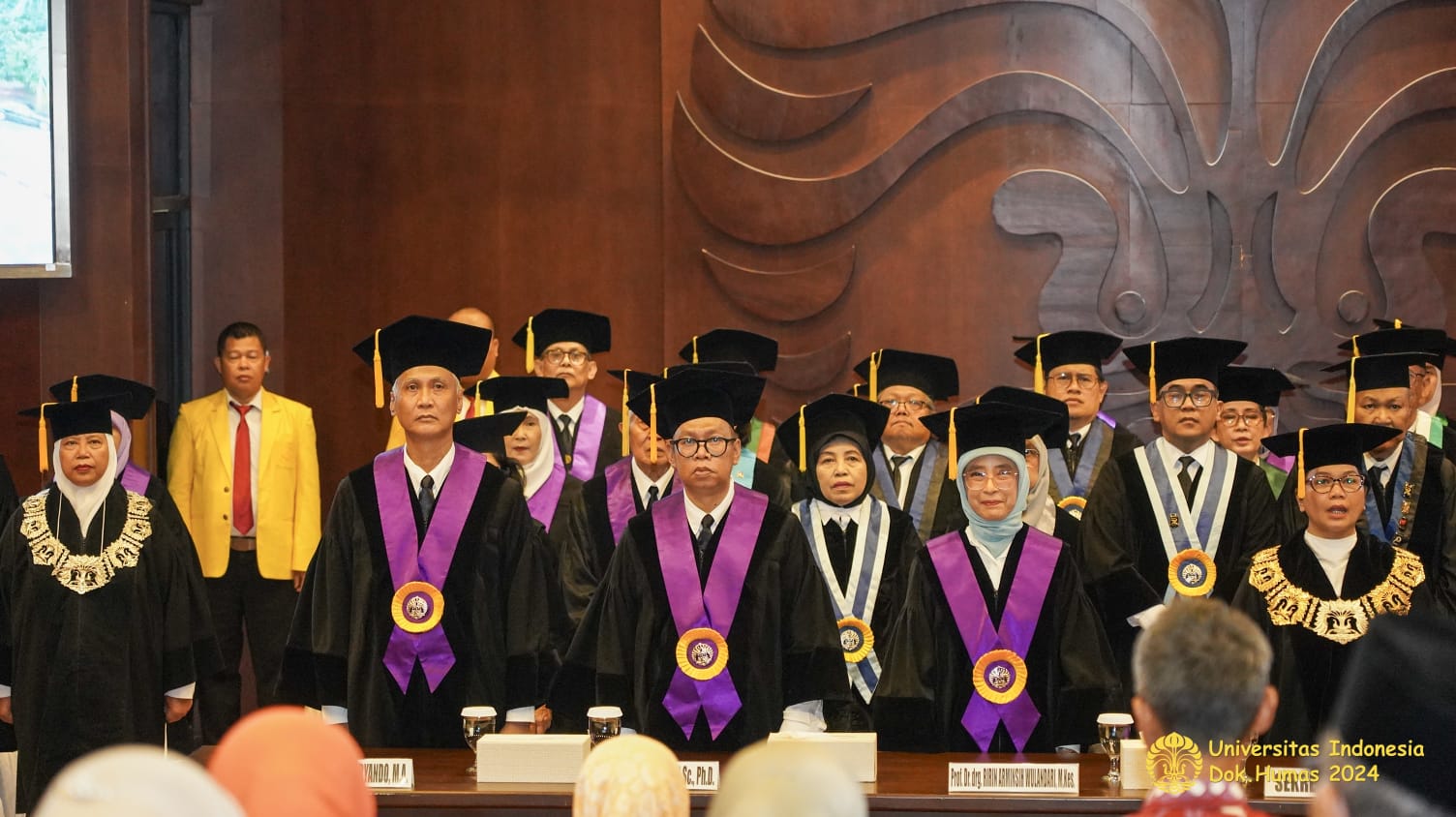On Saturday, November 16, 2024, the Universitas Indonesia (UI) inaugurated three new Professors from the Faculty of Public Health (FPH) at the UI Depok Campus Auditorium. The three professors are Prof. Dr. drg. Ririn Arminsih Wulandari, M.Kes., who was inaugurated as a Professor in the field of Environmental Health Epidemiology; Prof. Ir. Ahmad Syafiq, M.Sc., Ph.D., who was inaugurated as a Professor in the field of Nutritional Methodology; and Prof. Dr. Drs. Tris Eryando, M.A., who was inaugurated as a Professor in the field of Spatial Biostatistics.
In her inaugural speech titled “Hygiene and Food Sanitation as Pillars of National Food Safety,” Prof. Ririn emphasized the importance of food quality and safety to prevent health risks caused by food. Prof. Ririn explained that food hygiene and sanitation should be operational standards in various food industries, such as restaurants and catering services, and must refer to existing regulations, including the Ministry of Health Regulation No. 2 of 2023.
Prof. Ririn also highlighted the need for stronger policies in food sanitation to improve public health, food security, and nutrition. According to her, uncontrolled food incidents could cause international-scale problems. Therefore, she emphasized the crucial role of trained environmental health workers in overseeing hygiene and sanitation standards in food processing establishments and the implementation of food safety systems such as Hazard Analysis Critical Control Point (HACCP). Involving environmental health students was also considered a solution to address the shortage of personnel in the field and assist health departments in assessing Food Processing Facilities (TPP).
Furthermore, Prof. Ririn linked the importance of food sanitation with the government’s “Free Nutritious Food” program aimed at improving the quality of life in Indonesia, especially in tackling stunting. “This program requires strict supervision of food safety to ensure that the food provided is safe for consumption,” said Prof. Ririn. She emphasized that synergy between the government, business actors, environmental health professionals, and the public is essential to ensure food security that is safe, nutritious, and sustainable across all levels of Indonesian society.
Meanwhile, in his inaugural speech, Prof. Syafiq discussed the public health nutrition approach in Indonesia. He explained the dominance of clinical and curative approaches in addressing nutrition issues, such as stunting, which focus more on recovery than prevention.
Prof. Syafiq proposed that in addressing nutrition challenges in Indonesia, a broader approach is needed, one that involves other disciplines, as outlined in the Giessen Declaration (2005). In his speech, Prof. Syafiq introduced the concept of Public Health Nutrition, which focuses on prevention and addressing the root causes of nutrition problems. He suggested that public health programs should be strengthened with more comprehensive principles, providing examples of capital and capacity analysis in efforts to reduce stunting in Indonesia.
Moreover, Prof. Syafiq also highlighted several challenges in national nutrition policies and programs, including equity and nutrition justice, food security, and nutrition-related issues due to climate and environmental changes. Prof. Syafiq stressed the importance of enriching nutrition science with social and behavioral approaches to make nutrition programs more effective, efficient, and sustainable.
On the other hand, Prof. Dr. Drs. Tris Eryando, M.A., delivered his inaugural speech titled “Spatial Analysis for Optimizing the Use of Data from Various Sources to Support Decision Making.” Prof. Tris explained how spatial analysis can uncover the distribution patterns of health problems by considering geographical information, much like Dr. John Snow did in tracing the spread of cholera in London.
Prof. Tris emphasized that public health problems are very complex and require data from various sources, both from healthcare services and the community. He mentioned the importance of managing data from various levels of the health system, from community health centers to hospitals. “The challenges that often arise are merging data from different sources that have variability in collection methods and timing, which can affect the quality and accuracy of the data. Therefore, spatial analysis becomes a solution to manage and analyze data more accurately by considering relevant geographical variables,” explained Prof. Tris in his speech.
Furthermore, Prof. Tris explained that good-quality data is crucial for making accurate health decisions. Prof. Tris is optimistic that with the development of technology and spatial analysis, health data can be analyzed more deeply and specifically for certain regions. This will help in formulating policies and interventions that are more targeted. Prof. Tris continues to conduct research in this field and hopes that spatial analysis methods can be further optimized to support data-driven health policies that are accurate and valid.
These three Professors from FPH UI are consecutively the 33rd, 34th, and 35th professors inaugurated by the Universitas Indonesia in 2024. (wrk)

